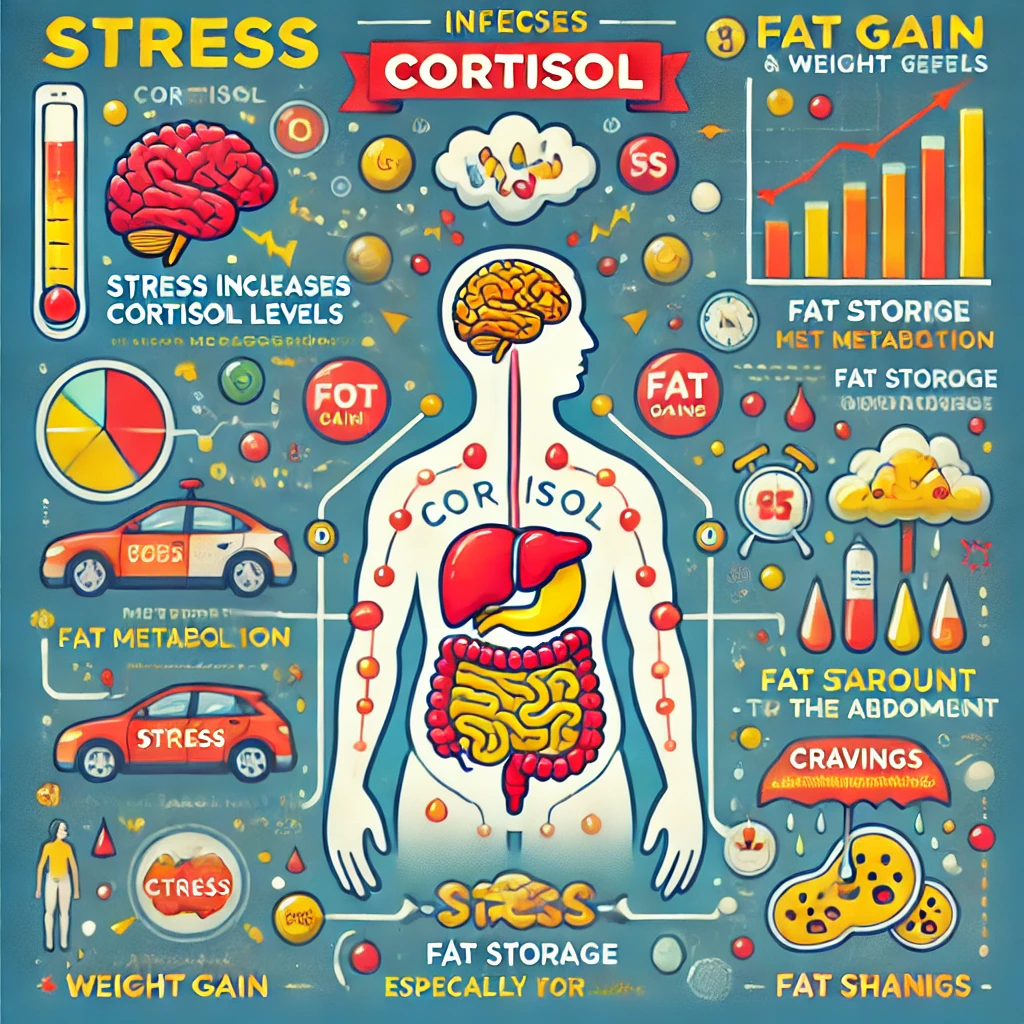Mastering stress to curb cortisol and emotional eating to lose fat and lose weight

The Link Between Stress and Weight Gain
Stress is closely linked to weight gain through a combination of hormonal, psychological, and behavioral factors. When stressed, the body releases cortisol, a hormone that increases appetite and cravings for high-fat, high-sugar foods. Chronic cortisol elevation can also lead to insulin resistance, causing higher blood sugar and fat storage, especially around the abdomen.
Stress often triggers emotional eating and cravings for comfort foods, which provide temporary relief by boosting dopamine. Over time, this pattern reinforces a cycle where stress leads to overeating. Additionally, stress can lower motivation for physical activity and disrupt sleep, both of which contribute to weight gain. Sleep disturbances from stress can further elevate cortisol levels and decrease impulse control, making healthy choices harder.
Breaking this cycle involves stress management techniques like mindfulness, exercise, and a balanced diet. Physical activity reduces cortisol and boosts mood, while nutrient-dense foods help stabilize energy levels, making it easier to resist cravings. By addressing the root causes of stress and fostering healthier habits, individuals can manage their weight more effectively despite life’s pressures.
Why Stress Can Lead to Weight Gain How Stress Impacts Your Metabolism
Stress can lead to weight gain primarily due to hormonal changes and lifestyle shifts it triggers. When stressed, the body releases cortisol, a hormone that prepares the body to respond to perceived threats by increasing appetite and storing fat, especially around the abdomen. This response is a survival mechanism, but in modern life, chronic stress keeps cortisol levels elevated, leading to persistent hunger and cravings for high-calorie comfort foods.
Stress also slows metabolism over time. Elevated cortisol impacts insulin, the hormone responsible for regulating blood sugar, and may increase insulin resistance. This change disrupts the body’s ability to efficiently convert food into energy, leading to more fat storage.
Additionally, stress often reduces motivation for physical activity and impairs sleep, which can further lower metabolism. This combination of increased appetite, cravings, and a slower metabolism creates a cycle that can easily lead to weight gain if stress is not managed.

How Stress Affects Your Hormones: Cortisol and Weight
Stress directly impacts hormones, especially cortisol, which plays a significant role in weight gain. When the body perceives stress, it releases cortisol to help manage the situation. This hormone increases blood sugar levels and stimulates appetite, often leading to cravings for high-sugar, high-fat foods. While helpful in short-term stress situations, chronic stress keeps cortisol levels elevated, resulting in constant hunger and a preference for calorie-dense foods.
Elevated cortisol also affects fat distribution, promoting fat storage around the abdomen. This “visceral fat” is linked to higher health risks, such as cardiovascular disease and metabolic disorders. Moreover, prolonged high cortisol levels can disrupt other hormones, like insulin, making it harder for cells to absorb glucose and increasing the likelihood of insulin resistance, which further promotes weight gain.
Managing stress through mindfulness, exercise, and healthy eating can help balance cortisol levels, reducing the likelihood of stress-induced weight gain.
Cortisol and Its Role in Belly Fat The Vicious Cycle of Stress and Fat Storage
Stress directly impacts hormones, especially cortisol, which plays a significant role in weight gain. When the body perceives stress, it releases cortisol to help manage the situation. This hormone increases blood sugar levels and stimulates appetite, often leading to cravings for high-sugar, high-fat foods. While helpful in short-term stress situations, chronic stress keeps cortisol levels elevated, resulting in constant hunger and a preference for calorie-dense foods.
Elevated cortisol also affects fat distribution, promoting fat storage around the abdomen. This “visceral fat” is linked to higher health risks, such as cardiovascular disease and metabolic disorders. Moreover, prolonged high cortisol levels can disrupt other hormones, like insulin, making it harder for cells to absorb glucose and increasing the likelihood of insulin resistance, which further promotes weight gain.
Managing stress through mindfulness, exercise, and healthy eating can help balance cortisol levels, reducing the likelihood of stress-induced weight gain.
The Connection Between Sleep and Weight Loss: Why Rest is Key to Shedding Pounds

Emotional Eating and Stress: Why We Crave
Comfort Foods
Emotional eating is a common response to stress, where people turn to “comfort foods” to cope with difficult emotions. During stress, the body releases cortisol, a hormone that heightens appetite and increases cravings for calorie-dense, sugary, and fatty foods. These foods stimulate the brain’s reward system by releasing dopamine, a neurotransmitter that induces feelings of pleasure and temporarily relieves stress. This rewarding feeling reinforces the habit, making people more likely to reach for comfort foods during future stressful moments.
Stress can also deplete serotonin, a neurotransmitter that helps regulate mood and promote calmness. Carbohydrate-rich comfort foods can temporarily boost serotonin, creating a soothing effect. This biochemical response, combined with emotional associations we may have with certain foods, leads many to rely on eating as a way to manage stress or sadness.
However, emotional eating can lead to a negative cycle. Weight gain, guilt, or dissatisfaction after overeating often add to the original stress, worsening emotional health. Developing healthy coping strategies—such as exercise, mindfulness practices, or talking with friends—can break this cycle. By addressing stress in healthier ways, individuals can manage their cravings and build a more balanced relationship with food.
Why Stress Makes You Crave Sugary and Fatty Foods
How Emotional Eating Sabotages Your Weight Loss Goals
Stress often makes people crave sugary and fatty foods due to both hormonal and psychological factors. When you’re stressed, your body releases cortisol, which triggers increased hunger and specifically enhances cravings for high-calorie, sugary, and fatty foods. These “comfort foods” activate the brain’s reward center, releasing dopamine, which provides a temporary sense of relief and pleasure, making these foods feel particularly satisfying during stressful times.
However, turning to food as a stress reliever can sabotage weight loss goals. High-calorie, low-nutrient foods contribute to excess calorie intake, often leading to weight gain. Moreover, the emotional eating cycle is self-reinforcing: the brief comfort from eating is soon replaced by guilt or regret, which can increase stress levels and prompt more eating, creating a loop that’s hard to break. This pattern undermines consistent progress in weight loss, as stress-driven eating tends to be impulsive and disconnected from actual hunger.
Breaking this cycle involves building healthier responses to stress, such as mindfulness, regular exercise, and finding other rewards that don’t involve food. Recognizing triggers and practicing mindful eating can help prevent stress from derailing weight loss goals, allowing individuals to handle stress more effectively without compromising their health goals.
Mindful Eating for Weight Loss: How to Control Cravings and Avoid Overeating.

How Managing Stress Can Boost Your Weight Loss Efforts
Managing stress is a powerful way to support weight loss efforts. When stress is high, the body releases cortisol, a hormone that increases appetite and drives cravings for sugary, high-fat foods, which can lead to overeating. Chronic stress keeps cortisol levels elevated, leading to fat storage—especially around the abdomen—and making it harder to lose weight.
Effective stress management techniques like regular exercise, mindfulness, and adequate sleep help reduce cortisol levels. Exercise not only burns calories but also releases endorphins, improving mood and reducing stress. Mindfulness practices, such as meditation and deep breathing, promote relaxation and help people become more aware of emotional eating triggers, reducing impulsive food choices. Prioritizing restful sleep also regulates hunger hormones, making it easier to make healthy choices.
By managing stress, individuals can curb cravings, reduce emotional eating, and create a stable foundation for consistent, healthy weight loss.
How Reducing Stress Helps You Make Better Food Choices
Improving Metabolism and Energy Levels with Stress Reduction
Reducing stress can significantly improve your food choices by promoting better decision-making and reducing emotional eating. When stressed, the body often craves comfort foods, which are typically high in sugar and fat, leading to poor nutritional choices. Chronic stress also triggers the release of cortisol, a hormone that increases hunger and encourages fat storage, particularly around the abdomen. By managing stress, individuals can lower cortisol levels, leading to more balanced hunger cues and a reduced urge to overeat.
Stress reduction techniques such as mindfulness, meditation, and exercise also help improve metabolism. Lower stress levels support the body’s ability to process and utilize nutrients efficiently, leading to better energy levels and overall health. When stress is under control, the body’s systems function more effectively, helping maintain a healthy weight, sustain energy throughout the day, and improve mood, all of which can support healthier food choices and habits.

Stress Management Techniques for Better Weight Loss Results
Effective stress management is crucial for achieving and maintaining weight loss. Stress triggers the release of cortisol, a hormone that not only increases appetite but also promotes fat storage, especially around the belly. Over time, chronic stress can hinder weight loss efforts by making it harder to control cravings, particularly for high-sugar and high-fat foods. Fortunately, there are several stress management techniques that can help enhance weight loss results:
Mindfulness and Meditation: Practicing mindfulness helps you stay present and focused, reducing emotional eating. Meditation can lower cortisol levels and improve overall mental clarity, making it easier to make healthy food choices.
Exercise: Physical activity is a powerful stress reliever that also helps with weight loss. Regular exercise, such as walking, yoga, or strength training, reduces cortisol and boosts endorphins, which improve mood and energy.
Breathing Exercises: Deep breathing techniques can activate the parasympathetic nervous system, promoting relaxation and reducing stress. Slow, deep breaths can calm the body, preventing stress-induced overeating.
Adequate Sleep: Poor sleep increases cortisol levels and disrupts hunger-regulating hormones. Prioritizing 7-9 hours of quality sleep per night can reduce stress and support weight loss.
Incorporating these stress management strategies into daily life can help you make healthier choices, regulate appetite, and create a more balanced, sustainable approach to weight loss.
Meditation and Deep Breathing for Stress Relief
Exercise and Its Dual Role in Stress and Weight Management
Journaling and Mindfulness to Reduce Stress-Related Eating
Meditation and Deep Breathing for Stress Relief
Meditation and deep breathing exercises are powerful tools for reducing stress. Meditation helps calm the mind, lower cortisol levels, and improve focus, making it easier to manage stress-related triggers. Deep breathing activates the body’s relaxation response by engaging the parasympathetic nervous system, helping reduce tension and promoting a sense of calm that counters stress.
Exercise and Its Dual Role in Stress and Weight Management
Exercise serves a dual purpose by reducing stress and aiding in weight management. Physical activity releases endorphins, which improve mood and reduce stress, while also increasing calorie burn to support weight loss. Regular exercise, such as yoga, running, or strength training, provides both immediate stress relief and long-term benefits for mental and physical well-being.
Journaling and Mindfulness to Reduce Stress-Related Eating
Journaling and mindfulness practices help bring awareness to stress-related eating habits. Writing down thoughts and emotions can clarify stress triggers, making it easier to respond healthily. Mindfulness encourages you to recognize hunger cues, allowing for more intentional and balanced food choices.
How to Maintain Weight Loss: Tips for Long-Term Success
